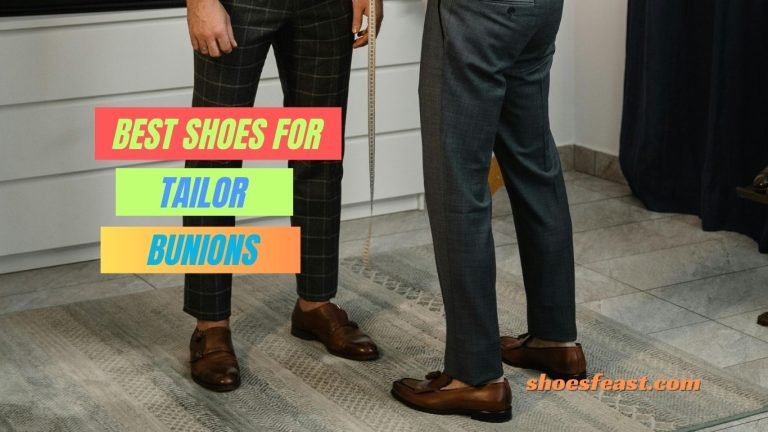The Best Work Shoes for Neuropathy You Absolutely Need
Living with neuropathy can make finding comfortable and supportive work shoes a daily challenge. Neuropathy often causes numbness, tingling, or pain in the feet, which means the wrong footwear can lead to serious discomfort and even injury over time. For those who spend hours on their feet at work whether in healthcare, retail, manufacturing, or office settings choosing the right pair of shoes is not just about style but essential for safety and long-term foot health. The correct footwear provides necessary support, cushioning, and protection, helping reduce pain and minimize pressure points. This guide will walk you through what to look for in work shoes if you have neuropathy and how the right choice can make your workday more comfortable, productive, and safe.
Top 10 Work Shoes for Neuropathy
Table of Contents
Toggle1. Orthofeet Lava Stretch Knit – Men & Women
The Orthofeet Lava Stretch Knit is a standout choice for individuals with neuropathy who require all-day comfort in a work environment. This shoe is engineered with Orthofeet’s unique Ortho-Cushion™ system, which integrates premium orthotic insoles, ergonomic soles, and air cushioning to alleviate foot pain. The stretch knit upper gently conforms to the shape of the foot, reducing pressure points and ensuring a soft, irritation-free fit. Its seam-free interior is designed specifically for sensitive feet, making it ideal for those with neuropathy, diabetes, or arthritis.
One of the shoe’s major strengths lies in its roomy toe box, allowing for natural toe splay and accommodating swelling or deformities without restriction. The lightweight, shock-absorbing sole promotes a smooth gait and reduces impact on joints—essential for anyone on their feet for extended periods. Breathability is also impressive, with the knit fabric promoting airflow and reducing moisture buildup. The removable insoles allow wearers to use their own orthotics if needed, increasing versatility.
For those seeking adjustability, the Lava Stretch Knit includes both a traditional lace-up closure and an additional pair of straps, ensuring a secure fit even if your feet fluctuate in size throughout the day. The wide, stable base helps with balance, reducing the risk of trips and falls in busy workplaces. The shoe is also stylish enough to transition from professional settings to casual outings.
Despite the many advantages, some users may find the price point higher than average work shoes, but the investment pays off in terms of pain relief and long-term foot health. The Orthofeet Lava Stretch Knit is especially suited for professions requiring prolonged standing or walking, such as nursing, teaching, or retail. For those with neuropathy, the combination of comfort, support, and adaptability is hard to match.
Pros:
-
Exceptional cushioning and orthotic support
-
Seam-free interior prevents irritation
-
Wide, stretchy toe box accommodates swelling
-
Breathable and lightweight construction
-
Adjustable fit with laces and straps
-
Removable insoles for custom orthotics
Cons:
-
Higher price point than typical work shoes
-
Style may not suit formal business attire
-
Limited color options
2. New Balance 928v3 Walking Shoe – Men & Women
The New Balance 928v3 is a popular and reliable choice for anyone seeking stability, support, and cushioning qualities that make it one of the best work shoes for neuropathy. This shoe features New Balance’s ROLLBAR stability post system, which helps control rear-foot movement for enhanced support and balance, crucial for those with nerve-related foot issues. Its ABZORB midsole offers superior shock absorption, while the removable PU footbed ensures extra cushioning.
A generous toe box allows the toes to relax naturally, reducing friction and the risk of pressure points or blisters. The 928v3 is constructed with either leather or mesh uppers, providing durability and breathability to suit various work environments. The odor-resistant treatment and moisture-wicking lining add to its comfort during long shifts.
Fit customization is a highlight, with a variety of widths available to accommodate narrow to extra-wide feet. The shoe’s firm heel counter enhances stability and reduces fatigue, while the non-marking, slip-resistant rubber outsole ensures safety on different surfaces. This makes the 928v3 ideal for healthcare workers, teachers, or anyone who spends extended hours on their feet.
Though the shoe is highly functional, its appearance is more utilitarian than fashionable, which may not appeal to all wearers. Some users also report a break-in period before maximum comfort is achieved. However, the overall durability and performance justify these minor drawbacks. For neuropathy sufferers, the New Balance 928v3 delivers the kind of stability and comfort needed to get through long workdays with less pain and more confidence.
Pros:
-
Excellent stability with ROLLBAR technology
-
Wide range of widths for custom fit
-
Superior shock absorption with ABZORB midsole
-
Roomy toe box reduces pressure
-
Durable and supportive for all-day wear
-
Removable insoles for orthotic use
Cons:
-
Appearance is somewhat bulky and plain
-
May require a short break-in period
-
Leather versions may feel warm in hot climates
3. Hoka One One Bondi 8 – Men & Women
Hoka’s Bondi 8 is renowned for its plush cushioning and smooth ride, making it a top pick for neuropathy sufferers who work in fast-paced or demanding environments. The Bondi 8’s full-length EVA midsole delivers maximum shock absorption, softening each step and alleviating pressure on sensitive nerves. Its rocker sole design encourages a natural rolling motion, reducing fatigue and promoting a more efficient gait.
The engineered mesh upper ensures breathability while providing a gentle, secure fit. A padded collar and tongue enhance comfort, preventing rubbing and pressure points that could aggravate neuropathy symptoms. The Bondi 8’s interior is designed to be nearly seamless, minimizing irritation for sensitive feet.
Fit is generous, with a spacious toe box that allows the toes to spread naturally ideal for anyone dealing with swelling or deformities. The shoe’s wide platform delivers excellent stability, reducing the risk of slips or falls, and the thick rubber outsole provides solid traction on both indoor and outdoor surfaces.
Although it’s one of the most cushioned shoes on the market, the Bondi 8 is surprisingly lightweight, allowing for ease of movement throughout long work shifts. However, its maximalist profile and running-shoe look may not appeal to those seeking a more traditional work shoe appearance. Some users also note that the thick sole can take time to get used to.
Overall, the Hoka Bondi 8 is a lifesaver for people with neuropathy who need to be on their feet all day. The unparalleled cushioning, roomy fit, and stable construction provide the support and comfort necessary for various work settings, from hospitals to warehouses.
Pros:
-
Unmatched plush cushioning for sensitive feet
-
Rocker sole promotes smooth walking
-
Breathable mesh upper
-
Wide platform for stability and balance
-
Lightweight for all-day wear
-
Roomy toe box and near-seamless interior
Cons:
-
Bulky, athletic look may not suit formal dress codes
-
Thick sole can feel unusual at first
-
Premium price point
4. Brooks Addiction Walker 2 – Men & Women
The Brooks Addiction Walker 2 is engineered for support, comfort, and durability, making it a reliable choice for workers living with neuropathy. This shoe is known for its Extended Progressive Diagonal Rollbar (PDRB), a technology that guides and supports your foot, ensuring proper alignment and stability with every step. The slip-resistant, certified outsole adds an extra layer of safety for those in dynamic work environments.
The insole features plush BioMoGo DNA cushioning, which adapts to your stride and absorbs impact. This results in reduced pressure on the feet, a critical factor for neuropathy sufferers. The full-grain leather upper is both supportive and durable, giving the shoe a polished look suitable for professional settings.
A standout feature is the broad, supportive base and roomy toe box. These elements ensure a comfortable fit even if your feet swell during the day or require additional space for orthotics. The lace-up design allows for adjustability, while the padded tongue and collar add extra comfort.
One of the advantages of the Addiction Walker 2 is its versatility: it transitions seamlessly from work to casual wear. However, the leather construction, while durable, may not be as breathable as mesh alternatives, potentially leading to warmth during long shifts. The shoe also tends toward a heavier build, which could be a drawback for those who prioritize lightweight footwear.
Overall, the Brooks Addiction Walker 2 is a dependable workhorse for neuropathy sufferers, offering the right blend of support, cushioning, and safety for demanding workdays.
Pros:
-
Excellent arch and motion control support
-
Slip-resistant, certified outsole for safety
-
Plush cushioning absorbs shock
-
Durable leather construction
-
Roomy toe box and supportive fit
-
Suitable for professional attire
Cons:
-
Leather upper can feel warm over long shifts
-
Heavier than some alternatives
-
Limited color variety
5. Skechers GOwalk Arch Fit – Men & Women
The Skechers GOwalk Arch Fit is designed for those who need both comfort and support without sacrificing style or convenience. Featuring podiatrist-certified Arch Fit insoles, this shoe provides structured arch support that helps distribute weight evenly and minimize pressure points—a must for anyone with neuropathy. The insole is also removable, making it orthotic-friendly.
Lightweight and flexible, the GOwalk Arch Fit uses an engineered mesh upper that conforms to the foot while allowing for optimal airflow. Its slip-on design with stretch laces offers easy on-off functionality while maintaining a secure fit, ideal for workers who are constantly on the move. The cushioning midsole delivers impressive shock absorption, and the flexible rubber outsole provides solid traction on a variety of work surfaces.
One of the shoe’s key advantages is its comfort over long periods of wear. The roomy fit reduces the likelihood of chafing, and the breathable fabric keeps feet cool and dry. The design is modern and versatile, suitable for both work and casual settings.
While the GOwalk Arch Fit is praised for comfort, some users may find the arch support too pronounced if they prefer a flatter feel. The slip-on design, though convenient, may not provide the same level of adjustability as traditional laces for those with swelling. The mesh material, while breathable, may not be ideal for very wet environments.
Overall, the Skechers GOwalk Arch Fit is an accessible and comfortable solution for neuropathy sufferers seeking reliable, everyday work shoes that keep pain at bay and allow for all-day movement.
Pros:
-
Certified arch support for even weight distribution
-
Lightweight and flexible build
-
Breathable mesh keeps feet cool
-
Slip-on design for convenience
-
Removable insole for custom orthotics
-
Modern, versatile look
Cons:
-
Arch support may feel high for some
-
Less adjustability than lace-up shoes
-
Mesh upper may not suit wet conditions
6. Dr. Comfort William X – Men
Dr. Comfort William X is engineered for men seeking relief from neuropathy while maintaining a professional look at work. It features an extra-depth design, offering ample room for custom orthotics and reducing pressure on sensitive feet. The top-grain leather upper delivers durability and a polished appearance, ideal for office or formal work environments. The protective toe box and padded tongue add a layer of comfort and defense against accidental bumps.
A removable gel insole offers substantial cushioning, working in tandem with a lightweight EVA midsole to absorb shock with every step. The William X’s construction is entirely seam-free on the interior, which prevents irritation and friction that can trigger neuropathic pain or sores. Side ventilation panels increase airflow, keeping feet cooler and drier, even during long shifts.
What sets the William X apart is its easy closure system, which uses both traditional laces and a Velcro strap. This ensures a snug, customizable fit and makes it easier to adjust throughout the day, accommodating any swelling that may occur. The outsole is slip-resistant, providing traction on various work surfaces and enhancing overall safety.
Although designed with comfort and protection as the top priorities, the William X is somewhat heavier than some athletic-inspired options. Some users may also find the fit wider than expected, which can be a plus for those with wider feet but less so for narrow-footed individuals. Its classic style, however, is timeless and versatile.
For professionals who need maximum protection and customizable comfort, the Dr. Comfort William X excels as a durable, supportive, and safe option for those with neuropathy.
Pros:
-
Extra-depth design accommodates custom orthotics
-
Seam-free interior prevents irritation
-
Durable, professional leather upper
-
Removable gel insole with strong shock absorption
-
Slip-resistant outsole for workplace safety
-
Adjustable fit with laces and Velcro
Cons:
-
Slightly heavier than athletic models
-
Fit may be too wide for narrow feet
-
Only available in classic, formal styles
7. Propet Stability Walker – Men & Women
The Propet Stability Walker is a trusted staple for those needing work shoes that blend comfort, support, and affordability. With its wider base and deep, supportive heel counter, this shoe provides excellent stability, which is crucial for people suffering from neuropathy who may struggle with balance. The firm heel counter reduces slippage and ensures that the foot remains properly aligned throughout the workday.
The upper is made from a combination of full-grain leather and mesh panels, creating a balance between durability and breathability. The padded tongue and collar ensure that the foot is cradled gently, while the spacious toe box accommodates swelling or custom orthotic inserts. Propet’s removable cushioned insole offers added versatility for those who require extra support.
One of the standout features is the extra-wide range of available widths, making the Stability Walker accessible to virtually every foot shape and size. The shoe also boasts a lightweight EVA midsole for shock absorption and a durable rubber outsole that provides dependable traction on slippery or wet surfaces—a must for workplace safety.
Though the shoe’s supportive structure makes it reliable for those with neuropathy, it is somewhat bulkier in appearance and may not suit all professional dress codes. Some users find the break-in period to be slightly longer than other shoes, but the payoff is long-term comfort and stability.
Overall, the Propet Stability Walker is an excellent option for anyone with neuropathy seeking an affordable, supportive, and durable work shoe that doesn’t compromise on comfort or fit.
Pros:
-
Wide base and deep heel counter for stability
-
Multiple width options accommodate all feet
-
Breathable leather and mesh upper
-
Removable insole for custom orthotics
-
Durable slip-resistant outsole
-
Excellent value for the price
Cons:
-
Bulky design may not fit formal settings
-
Slightly longer break-in period
-
Style is more utilitarian than trendy
8. Alegria Debra Professional – Women
Alegria’s Debra Professional is a favorite among female professionals, especially in healthcare, due to its exceptional comfort, vibrant design choices, and long-term support. The shoe features a rocker bottom sole, which helps roll the foot naturally through each step and reduces strain on pressure points beneficial for those with neuropathy who experience foot fatigue or pain.
The insole is composed of a blend of memory foam, cork, and latex, providing both cushioning and moldable support. This removable footbed allows the insertion of custom orthotics, ensuring personalized comfort for anyone with neuropathic conditions. The leather upper is stain-resistant, making the Debra Professional easy to clean and maintain a practical advantage for those in clinical or food service jobs.
Its slip-on design is enhanced by elastic gores at the instep, which offer flexibility and an easy on/off experience while keeping the shoe secure throughout busy shifts. The roomy toe box reduces pressure on sensitive toes, and the interior is crafted to minimize seams and reduce irritation.
While the thick, rocker-bottom sole may take some time to get used to, it pays off in long-term pain reduction and improved gait. The colorful and bold patterns may not be for everyone, especially in stricter dress code environments, but they do provide a fun alternative for self-expression.
Alegria’s Debra Professional stands out as a supportive, comfortable, and stylish option for women who need reliable footwear to manage neuropathy during demanding workdays.
Pros:
-
Rocker bottom sole reduces foot strain
-
Removable insole for orthotic use
-
Stain-resistant, easy-clean leather upper
-
Spacious toe box for comfort
-
Fun and unique design options
Cons:
-
Not all styles suit formal dress codes
-
Rocker sole may require an adjustment period
-
Slightly heavier than standard slip-ons
9. Dansko Professional Clog – Men & Women
Dansko’s Professional Clog is a classic choice for those in the healthcare, culinary, or service industries, and it’s widely recommended for neuropathy due to its stable, protective design. The contoured PU midsole offers excellent shock absorption and arch support, helping to reduce the impact on sensitive nerves and keep feet supported during long shifts.
The clog’s roomy toe box and reinforced toe cap are ideal for neuropathic feet, providing space and safeguarding against workplace hazards. Its anti-fatigue rocker bottom sole encourages a natural walking motion, lessening strain on the forefoot and heel. The leather upper is both durable and professional in appearance, suiting a range of work settings.
Inside, the clog features a padded instep collar for comfort and a soft, smooth lining that prevents chafing and irritation. The slip-resistant outsole is a must for wet or slick work environments, offering safety alongside support.
Some users may need time to adapt to the feel of the raised heel and rocker sole, especially if transitioning from athletic shoes. Additionally, the clog is heavier than typical lace-up or mesh shoes, and the fit may be loose for those with narrow feet unless worn with thick socks.
Nevertheless, Dansko’s Professional Clog remains a top choice for reliable, easy-to-clean, and long-lasting work footwear for people managing neuropathy.
Pros:
-
Contoured midsole and rocker bottom for support
-
Reinforced toe and roomy fit
-
Slip-resistant outsole for safety
-
Padded collar for extra comfort
-
Durable, professional leather exterior
Cons:
-
Heavier than athletic shoes
-
Raised heel may feel unusual initially
-
May feel loose on narrow feet
10. Vionic Walker Classic – Men & Women
The Vionic Walker Classic delivers orthotic-grade support in a traditional walking shoe design, making it ideal for professionals who need both comfort and subtlety in their footwear. The shoe features a podiatrist-designed, removable EVA footbed with a deep heel cup and ample arch support. This promotes natural alignment and relieves pressure, which is critical for neuropathy sufferers.
The upper combines leather with mesh panels, balancing structure with breathability. The moisture-wicking interior lining keeps feet dry, reducing the risk of fungal infections or irritation during long workdays. The full lace-up design allows for a customizable, secure fit, adapting to the unique shape of each wearer’s foot.
Vionic’s durable rubber outsole is patterned for enhanced grip and traction, ensuring safety on a variety of surfaces. The shoe’s lightweight construction reduces fatigue, while the moderately wide toe box provides space for swelling or toe movement. The overall look is classic and understated, fitting well into most workplace environments.
Though the Walker Classic is praised for its firm support, some may find the arch slightly aggressive if they prefer a flatter feel. Also, the break-in period can be a little longer due to the firm structure, but most users report significant improvement in comfort and support with continued use.
For those seeking orthotic-level support in a work-appropriate design, the Vionic Walker Classic is a dependable solution for managing neuropathy at work.
Pros:
-
Podiatrist-designed orthotic support
-
Removable insole for custom orthotics
-
Moisture-wicking, breathable lining
-
Durable outsole with strong grip
-
Classic, workplace-friendly style
Cons:
-
Arch support may feel firm for some
-
Slightly longer break-in period
-
Style is conservative, not trendy
Buyer’s Guide
Selecting the best work shoes for neuropathy involves more than just picking a comfortable pair. It’s about ensuring your shoes work for your unique needs, providing support, stability, and protection throughout the workday. Here are the key factors to consider:
1. Comfort and Cushioning:
Neuropathy can make your feet more sensitive to pressure and impact. Shoes with extra cushioning, especially in the insole and midsole, help absorb shock and distribute weight evenly. Look for shoes with memory foam, gel inserts, or removable insoles that you can replace with custom orthotics if necessary.
2. Roomy Toe Box:
A wider toe box prevents your toes from feeling cramped and reduces friction, which is vital for anyone with neuropathy. Tight shoes can worsen nerve pain and lead to blisters or sores. Make sure there’s enough room to wiggle your toes freely.
3. Arch and Heel Support:
Proper arch support is crucial for maintaining foot alignment and reducing stress on sensitive nerves. Shoes with supportive arches and firm heel counters help stabilize your foot and prevent excessive movement, reducing the risk of injury and fatigue.
4. Breathable and Soft Materials:
Choose shoes made from soft, flexible, and breathable materials such as mesh or high-quality leather. These materials help reduce irritation and keep your feet cool and dry, preventing issues like sweating and fungal infections.
5. Durability and Grip:
If your job requires walking or standing for long hours, durable shoes with slip-resistant soles are essential. Good traction prevents slips and falls, which can be especially dangerous if you have reduced sensation in your feet.
6. Adjustability:
Features like Velcro straps or adjustable laces allow you to fine-tune the fit throughout the day, accommodating any swelling that may occur.
7. Avoid Heavy or Rigid Shoes:
Heavy shoes can cause additional fatigue, and rigid shoes can create pressure points that irritate sensitive feet. Opt for lightweight designs that still provide structure and support.
Final Tip:
Always try on shoes at the end of the day when your feet are slightly swollen. Walk around and pay attention to any discomfort. If you use orthotics, bring them along to ensure the shoes fit well with them.
What to Avoid:
-
Narrow or pointed shoes
-
High heels
-
Shoes with hard seams or stitching inside
-
Inflexible soles
-
Poor ventilation
Choosing shoes with these criteria in mind can help you manage neuropathy symptoms at work and keep your feet healthy and comfortable day after day.
FAQ
1. What features should I prioritize in work shoes for neuropathy?
Focus on shoes with cushioned insoles, a roomy toe box, arch support, and a flexible yet stable sole. Breathable, soft materials and adjustable closures are also important. These features help reduce pressure points, support healthy foot alignment, and minimize discomfort.
2. Can I use orthotics with work shoes for neuropathy?
Yes, using orthotics is highly recommended if you have neuropathy, especially if prescribed by a podiatrist. Choose shoes with removable insoles so you can easily insert your custom or over-the-counter orthotics for added support and comfort.
3. Are slip-on shoes good for neuropathy?
Slip-on shoes can be convenient, but they often lack the adjustability and support needed for neuropathic feet. Instead, opt for shoes with adjustable laces or Velcro straps to ensure a secure and customized fit, which helps prevent unnecessary movement and friction.
4. How often should I replace my work shoes if I have neuropathy?
People with neuropathy should replace their work shoes every 6-12 months, or sooner if the shoes show signs of wear. Worn-out shoes lose their cushioning and support, which can worsen symptoms and increase the risk of injury.
5. What should I avoid in work shoes if I have neuropathy?
Avoid shoes with tight or pointed toe boxes, high heels, hard internal seams, or rigid construction. These design features can increase pressure on sensitive nerves and lead to blisters, calluses, or sores especially dangerous if you have reduced sensation.
6. How can I ensure the best fit when buying work shoes for neuropathy?
Shop in the late afternoon or evening when your feet are naturally more swollen. Wear your usual work socks and bring your orthotics if you use them. Walk around the store and ensure there are no areas of tightness, pinching, or slipping. There should be about a half-inch space in the toe box.
7. Are there specific brands known for making shoes suitable for neuropathy?
Yes, several brands are highly rated for their comfort and support, including New Balance, Brooks, Orthofeet, Hoka, and Skechers. However, the best shoe will depend on your individual needs and preferences, so always prioritize fit and comfort over brand reputation.
Conclusion
Choosing the right work shoes for neuropathy is vital for maintaining comfort, safety, and productivity. Supportive features, ample cushioning, roomy designs, and non-slip soles can dramatically reduce pain and prevent complications. Always prioritize fit, breathability, and adjustability to support your foot health and well-being, ensuring each workday is as safe and pain-free as possible.






